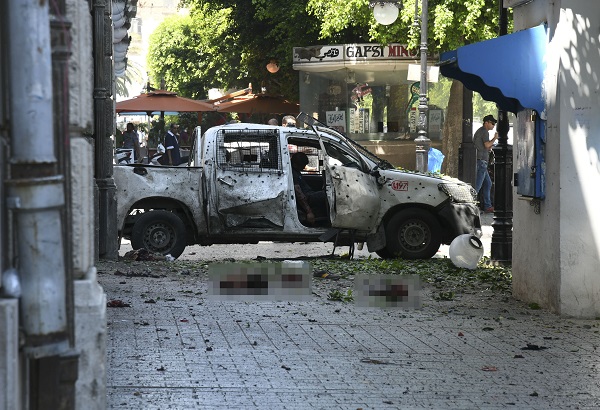
Tunis, A double suicide bombing in the Tunisian capital on Thursday killed a police officer and injured at least eight others, officials said.
The first blast occurred before midday when a suicide bomber hit a police patrol vehicle on the corner of Rue Charles de Gaulle and Avenue de France in downtown Tunis, an area of the city busy with pedestrians and not far from the heavily-guarded French Embassy.
“There was a huge explosion which rocked the whole street. People fled running in all directions,” an eyewitness told Efe news just metres from the entrance of the city’s medina, a tourist hotspot.
Minutes after the explosion, the Interior Ministry confirmed there had been a fatality.
“One of the two seriously injured officers has died,” the Ministry said. “Three civilians have been hospitalized with injuries of varying degrees of gravity,” it added.
Security services quickly cordoned off the scene of the attack and ushered onlookers away to clear a path for ambulances.
Body parts belonging to the alleged bomber were strewn across the road.
Ten minutes after the first blast, a second bomber attacked the police’s counter-terror department in the Al Gorjani neighbourhood of the city, officials said.
At least four security personnel were injured in the Al Gorjani bombing — two of them seriously, according to Interior Ministry spokesman Sofien Zaak.
No group has claimed responsibility for the bombings.
State TV reported a third attack in the coastal city of Sousse, one of the holiday hotspots in the North African country, but the news was later dismissed as false.
The attack came a day after the fourth anniversary of the Sousse attack, in which gunman went on a rampage on a Tunisian seaside resort, killing 38 people. The Islamic State claimed responsibility for that incident.
Tunisia is considered the fourth-largest exporter of foreign extremists joining the Islamic State terror organization in Iraq and Syria.
Furthermore, since the 2011 revolution, which triggered a wave of pro-democracy protests across North Africa and the Middle East in what came to be known as the Arab Spring, several extremist groups have been embroiled in a low-intensity conflict with state security.









